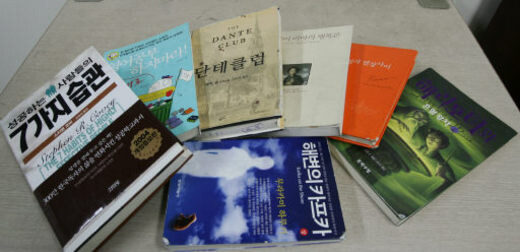hankyoreh
Links to other country sites 다른 나라 사이트 링크
South Koreans seek books for self-improvement

What are South Koreans’ favorite books of the 21st century?
A majority of Korean readers picked up books that they believe could help make money and improve their ability regarding jobs and social life.
According to a survey by biweekly magazine ‘Planning Meeting,’ 20 percent of the top 200 bestsellers since 2000 are titles related to the economy or business. Practical books, which could be included in self-help books, accounted for 11 percent. Books for children’s education stood at 8 percent of the bestsellers, and academics-related comic books, which could also comprise a wide range of self-improvement, were at 5 percent.
If all books for information and study are included, books related to self-improvement account for nearly half the list of bestsellers.
In contrast, humanities titles comprised less than five percent of the 200 bestsellers, with science titles at just one percent.
This trend is predictable, experts say, because South Korea has been reeling from being hit hard by the Asian financial crisis in the late 1990s. Amid the ensuing financial turmoil and restructuring and an influx of neo-liberal politics and policies, experts said, the results showed South Koreans have put their focus on self-improvement for survival.
In the wake of the financial crisis and subsequent International Monetary Fund bailout, books that promised to help its readers make a big fortune won in popularity. While such ‘get rich quick’ books are not seen much anymore, books relating to financial knowledge and long-term economic stability are still prevalent. Books for self-improvement such as ‘The Seven Habits for Highly Effective People’ by Stephen Coby as well as others related to time management, speaking skills, and human relations were on the list, as well.
Foreign novels came next in popularity. Since 2002, the three top-selling foreign novels are the ‘Harry Porter’ books by J.K. Rowling, ‘The Alchemist’ by Paulo Coehlo, and ‘The Da Vinci Code’ by Dan Brown, three novels that have seen commercial success worldwide. In addition, several Japanese writers, such as Kaori Eguni, the writer of ‘Between Calm and Passion’ and Haruki Murakami, the author of ‘Kafka by the Shore,’ have made their name among South Korean readers. Foreign novels accounted for 17 percent of the bestseller list .
Nonfiction got as much attention as foreign novels, with 17 percent of these titles also comprising the bestseller list. In 2000, the best-selling nonfiction book was ‘Du Bon Usage de la Lenteur’ by France’s Pierre Sansot, while the top seller in 2006 was ‘Life Lessons’ by U.S. author David Kessler and Swiss-born Elizabeth Kubler-Ross. Both are about using one’s time in life wisely and more fully. Other nonfiction titles on the list were ‘The Blue Day Book,’ ‘Papepopo Memories,’ ‘Briquet Road’ and ‘The Man, The Woman.’ Of these nonfiction titles, some are true-life stories containing elements of life’s harsh reality, depression, and loss, as well as a sense of instinctive self-preservation under conditions of limitless competition and globalization. Others seek alternatives to the hardships of modern life either through self-reflection or self-reliance.
Given this sentiment - a stark contrast to the optimistic self-help titles on the list - it comes as no surprise that the bestseller list was rounded out by religious titles such as ‘No Possession,’ ‘Anger’ and ‘The Art of Happiness by the Dalai Lama.’
Please direct questions or comments to [englishhani@hani.co.kr]
Editorial・opinion
![[Column] Park Geun-hye déjà vu in Yoon Suk-yeol [Column] Park Geun-hye déjà vu in Yoon Suk-yeol](https://flexible.img.hani.co.kr/flexible/normal/500/300/imgdb/original/2024/0424/651713945113788.jpg) [Column] Park Geun-hye déjà vu in Yoon Suk-yeol
[Column] Park Geun-hye déjà vu in Yoon Suk-yeol![[Editorial] New weight of N. Korea’s nuclear threats makes dialogue all the more urgent [Editorial] New weight of N. Korea’s nuclear threats makes dialogue all the more urgent](https://flexible.img.hani.co.kr/flexible/normal/500/300/imgdb/original/2024/0424/7317139454662664.jpg) [Editorial] New weight of N. Korea’s nuclear threats makes dialogue all the more urgent
[Editorial] New weight of N. Korea’s nuclear threats makes dialogue all the more urgent- [Guest essay] The real reason Korea’s new right wants to dub Rhee a founding father
- [Column] ‘Choson’: Is it time we start referring to N. Korea in its own terms?
- [Editorial] Japan’s rewriting of history with Korea has gone too far
- [Column] The president’s questionable capacity for dialogue
- [Column] Are chaebol firms just pizza pies for families to divvy up as they please?
- [Column] Has Korea, too, crossed the Rubicon on China?
- [Correspondent’s column] In Japan’s alliance with US, echoes of its past alliances with UK
- [Editorial] Does Yoon think the Korean public is wrong?
Most viewed articles
- 1[Column] Park Geun-hye déjà vu in Yoon Suk-yeol
- 2Will NewJeans end up collateral damage in internal feud at K-pop juggernaut Hybe?
- 3Why Korea shouldn’t welcome Japan’s newly beefed up defense cooperation with US
- 4N. Korean hackers breached 10 defense contractors in South for months, police say
- 5[Guest essay] The real reason Korea’s new right wants to dub Rhee a founding father
- 6Thursday to mark start of resignations by senior doctors amid standoff with government
- 7[Editorial] New weight of N. Korea’s nuclear threats makes dialogue all the more urgent
- 8[Column] ‘Choson’: Is it time we start referring to N. Korea in its own terms?
- 9Kim Jong-un expressed ‘satisfaction’ with nuclear counterstrike drill directed at South
- 10The dream K-drama boyfriend stealing hearts and screens in Japan